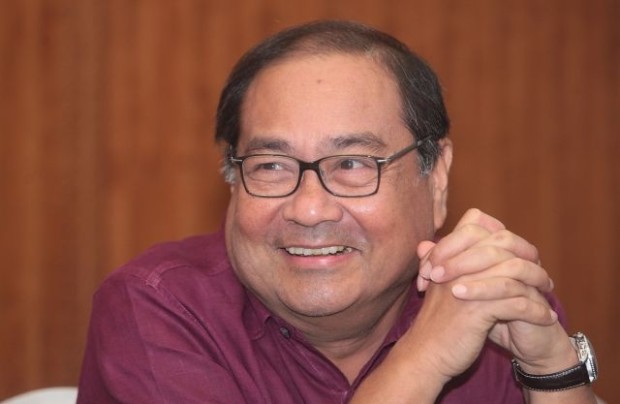
Former Government Security Insurance System (GSIS) president Winston Garcia (CDN PHOTO/TONEE DESPOJO)
The Sandiganbayan has reaffirmed the dismissal of the graft case against former Government Security Insurance System (GSIS) president Winston Garcia involving an allegedly anomalous eCard project with the Union Bank of the Philippines.
In a resolution promulgated on July 4, the anti-graft court Second Division said it denied the motion for reconsideration filed by the prosecution seeking to reverse the ruling of the court which dismissed the graft charge due to the Ombudsman’s inordinate delay in filing the case.
READ: Prosecutors appeal dismissal of Garcia’s graft rap
The court said it sustained its March 17 ruling that the Ombudsman committed inordinate delay when it took 10 years to investigate the complaint before filing it with the Sandiganbayan on Sept. 2, 2015.
READ: Sandigan junks graft rap vs ex-GSIS chief Garcia
The court said the Ombudsman could not dissociate the preliminary investigation and fact-finding investigation if the aggregate time violated Garcia’s constitutional right to a speedy trial.
“The Court sustains its finding… that inordinate delay intervened in this case. Allowing the case to proceed beyond the 10-year period that it has lamentably dragged in the fact-finding and preliminary investigation stages would not only violate the constitutional mandate on speedy disposition of cases but would also work further prejudice on the accused who have to contend with a case forever dangling over their heads,” the court said.
According to the graft charge filed by state prosecutors, Garcia in 2004 allegedly gave undue preference to Union Bank, causing damages in government by awarding the GSIS eCard project to the said bank without complying with the requirements under the implementing rules and regulations of the Government Procurement Reform law.
READ: Ex-GSIS execs face graft charges over 2004 deal
The GSIS eCard is an ATM card used to disburse funds to the members of the state pension fund, the court noted.
The court said the complaint against Garcia was filed before the Ombudsman on April 1, 2005, but the anti-corruption agency took 10 years to investigate the complaint before filing it before the Sandiganbayan on Sept. 2, 2015.
The Ombudsman investigators took six years or until Sept. 12, 2011 to docket the complaint as a regular case.
The Ombudsman had said the field investigation took six years due to a parallel congressional investigation in the House of Representatives.
The court said the Ombudsman’s Field Investigation Office “slumber(ed) through those six years” as if waiting for the results of the congressional investigation.
“By way of peroration, the Court rules that on the ground alone of violation of speedy disposition of the case, his case ought to be dismissed outright,” the court said.
Moreover, the court reaffirmed its ruling finding no probable cause to try Garcia for graft over allegations that he violated the procurement law by unlawfully resorting to limited source bidding, or selective bidding, in favor of Union Bank.
The court found that the GSIS had invited its depository banks as well as private banks to be its partner for the e-card project: Union Bank, Land Bank of the Philippines, Philippine National Bank, Development Bank of the Philippines, Bank of Philippine Islands, and Equitable PCI Bank.
The GSIS technical committee chose the Union Bank as the most advantageous to the GSIS according to the results of its financial and technical evaluation.
The court said none of the losing banks “raised a whimper” after the Union Bank was chosen.
The Commission on Audit also did not issue a notice of disallowance on the project.
“There is likewise no reason for the Court to reverse or reconsider its finding that no probable cause exists against all the accused. It has not been shown how they gave unwarranted benefits, advantage or preference to Union Bank of the Philippines when the eCard project was awarded to it after several other banks, to which invitations to submit proposal were sent, were unable to submit complete proposals,” the court said.
The court said the eCard project “was a novel concept and hence, no sufficient guidelines to comply with the bidding requirement were available.”
Under Section 3 (e) of the Anti-Graft and Corrupt Practices Act, a public official, in the discharge of his or her official functions, is prohibited from inflicting any undue injury or giving unwarranted benefits, advantage or preference to any person or entity.
Also cleared of graft raps were some of Garcia’s co-accused: former GSIS officials executive vice president Enriqueta Disuanco, senior vice president Benjamin Vivas Jr., board of trustees chair Hermogenes Concepcion Jr., and members Elmer Bautista, Fulgencio Factoran, Floriño Ibañez, Aida Nocete, Reynaldo Palmiery, Ellenita Tumala-Martinez and Leonora Vasquez-de Jesus.
The court reaffirming the resolution was penned by Associate Justice Teresita Diaz-Baldos and concurred in by Associate Justices Napoleon Inoturan and Michael Frederick Musngi.
The Ombudsman had accused the GSIS of awarding the project to Union Bank “despite the fact the closing date for submission of bid proposals has not been closed and prior to the recommendation of the committee tasked to evaluate the proposals.”
In its website, the GSIS described the eCard project as its “most innovative government-issued identification card today.”
“This is because the eCard Plus is not just a GSIS membership ID Card, it is also a GSIS transactional card, disbursement card, ATM Card, VISA debit card, hospitalization discount card, medicine discount card, and tuition discount card, among others,” the website read.
Garcia, who was appointed GSIS president by former President Gloria Arroyo, is the president of the local party One Cebu. He lost the gubernatorial race in the May 9 elections against winning reelectionist Hilario Davide III. JE/rga